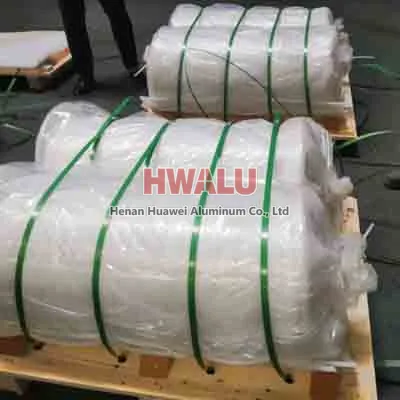Soft Temper Jumbo Aluminum Foil Roll Introduction Welcome to Huawei Aluminum, your trusted partner in the world of aluminum foil solutions. As a leading factory and wholesaler, we take pride in offering premium Soft Temper Jumbo Aluminum Foil Rolls that cater to a diverse range of industries and applications. With a commitment to quality and excellence, Huawei Aluminum stands as a beacon of reliability in the al ...
Aluminum foil thickness for different purposes Alloy Alloy state Typical thickness(mm) Processing methods End use smoke foil 1235-O、8079-O 0.006~0.007 Composite paper, coloring, printing, etc. Used in cigarette packaging after lining, printing or painting. Flexible packaging foil 8079-O、1235-O 0.006~0.009 Composite paper, plastic film embossing, coloring, printi ...
What is Aluminum Foil for Coffee Capsules Aluminum foil for coffee capsules generally refers to small capsules used to package single-serve coffee, which are filled with selected ground coffee for freshness and convenience. This capsule is usually made of aluminum foil, because aluminum foil is a material with good oxygen barrier and moisture resistance, which can prevent the coffee powder from moisture, oxid ...
What is 1050 H18 aluminum foil 1050 H18 aluminum foil is an aluminum foil material with high purity and good mechanical properties. Among them, 1050 represents the grade of aluminum alloy, and H18 represents the hardness level. 1050 aluminum alloy is an aluminum alloy with a purity of up to 99.5%, which has good corrosion resistance, thermal conductivity and machinability. H18 represents the aluminum foil aft ...
Aluminum foil parameters Raw Material 1235, 3003, 8011 etc Alloy Temper O, H28, etc Thickness 6.5 micron, 10 microns, 11micron( 11 microns), 20micron, 130-250mic ( for laminated foil cold forming ) Size 3000m, 80 cm, etc We can provide jumbo roll aluminum foil Product Name Alloy Temper Thickness or Gauge(mm ) Width(mm ) Surface Finishing Use Aluminum Foil For Foo ...
Food packaging aluminum foil is related to human health and safety, and is usually produced with specific specifications and characteristics to ensure its suitability for the food industry. The following are some common specifications of aluminum foil for food packaging: Food packaging foil alloy types: Aluminum foil used for food packaging is usually made from 1xxx, 3xxx or 8xxx series alloys. Common alloys in ...
The biggest feature of aluminum foil is its light weight and wide range of uses, suitable for aviation, construction, decoration, industry and other industries. Aluminum is very cost-effective, and its electrical conductivity is second only to that of copper, but the price is much cheaper than that of copper, so many people now choose aluminum as the main material for wires. 1060, 3003, 5052 are several common ...
1. Chemical composition: The alloy grades of aluminum foil for heat exchange fins mainly include 1100, 1200, 8011, 8006, etc. From the perspective of use, air conditioners do not have strict requirements on the chemical composition of aluminum heat exchange fins. Without surface treatment, 3A21 aluminum alloy has relatively good corrosion resistance, high mechanical properties such as strength and elongation, ...
Single-sided carbon-coated aluminum foil is a breakthrough technological innovation that uses functional coatings to treat the surface of battery conductive substrates. Carbon-coated aluminum foil/copper foil is to uniformly and finely coat dispersed nano-conductive graphite and carbon-coated particles on aluminum foil/copper foil. It can provide excellent electrostatic conductivity, collect the micro-current ...
The aluminum foil disposable lunch box has excellent oil and water resistance and is easy to recycle after being discarded. This kind of packaging can quickly reheat the food and keep the fresh taste of the food. 1. Performance of aluminum foil tableware and containers: All kinds of food lunch boxes produced by aluminum foil, aviation lunch boxes currently generally adopt the latest and most scientific alum ...
Aluminum foil pinhole has two main factors, one is the material, the other is the processing method. 1. Improper material and chemical composition will lead to a direct impact on the pinhole content of fake aluminum foil Fe and Si. Fe>2.5, Al and Fe intermetallic compounds tend to form coarse. Aluminum foil is prone to pinhole when calendering, Fe and Si will interact to form a firm compound. The number of ...








